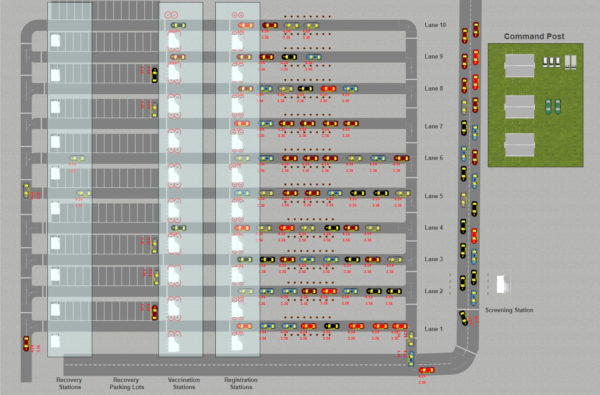New simulation AI apps allow public health agencies to plan for mass COVID-19 vaccinations
TORONTO, Nov. 20, 2020 – Once a viable COVID-19 vaccination is ready, the logistics of how to vaccinate everyone becomes one of the next hurdles. Researchers at York University have developed a solution, an artificial intelligence drive-through mass vaccination simulation application that can help clinics and public health agencies plan for mass vaccinations ahead of time.
The drive-through simulation app and its artificial intelligence version, now available online, can be used to determine how to best immunize large numbers of people against SARS-CoV-2, rapidly and safely, once the vaccine has been produced and distributed. Drive-through facilities have been used for immunizations for other diseases and COVID-19 testing, but this tool allows for enhanced planning, design, operation, feasibility, and effectiveness assessments.

An example of the drive-through vaccine simulation app showing how 10 lanes could be configured
The research team, led by Faculty of Liberal Arts & Professional Studies Associate Professor Ali Asgary, associate director of the Advanced Disaster, Emergency and Rapid Response Simulation (ADERSIM) in collaboration with the Laboratory for Applied and Industrial Mathematics (LIAM), led by Professor Jianhong Wu of the Faculty of Science, developed the tool. ADERSIM is comprised of collaborators across the University and with outside institutions to integrate mathematical modelling, machine learning and artificial intelligence.

Associate Professor Ali Asgary
“The success of vaccine development, production, and distribution will depend on timely and efficient dispensing. That will require extraordinary advance planning and preparation at different levels, locally, nationally, and internationally,” says Asgary. “The development of simulation tools that build capacities and enable planning and preparation become essential.”
The tool can visually and numerically show the average processing and waiting times depending on the number of cars and people that would be using the drive-through. Users can also plug in different staff numbers, service lanes, time for screening, registration, and immunization, as well as recovery times under various scenarios. It allows health-care decision makers to plan efficient drive-through mass vaccination clinics ahead of time by setting input variables and seeing the results.
For example, if there are 10 open lanes with four staff at each station over three shifts with a fixed rate of five incoming cars per minute, the model showed a total of 1,771 cars with 5,330 passengers using the drive-through per day. The average time for each car to go through the drive-through was between 80 and 90 minutes.
“The kind of large-scale implementation needed for the COVID-19 vaccine could be one of the most challenging public health actions this decade with many local mass vaccination sites in each city, town and province,” says Asgary.
It’s also available for use globally. The model can help decision makers estimate how many drive-through facilities, among other vaccination methods, would be needed to achieve a certain number of immunizations in a specific period.
As not everyone will be able to use a drive-through centre, the team is also developing simulation tools and applications for walk-in vaccination clinics.
The paper, A drive-through simulation tool for mass vaccination during COVID-19 pandemic, is published in a special issue of the journal Healthcare – COVID-19 Pandemic: Challenges Facing the Health System.
-30-
York University champions new ways of thinking that drive teaching and research excellence. Our students receive the education they need to create big ideas that make an impact on the world. Meaningful and sometimes unexpected careers result from cross-disciplinary programming, innovative course design and diverse experiential learning opportunities. York students and graduates push limits, achieve goals and find solutions to the world’s most pressing social challenges, empowered by a strong community that opens minds. York U is an internationally recognized research university – our 11 faculties and 25 research centres have partnerships with 200+ leading universities worldwide. Located in Toronto, York is the third largest university in Canada, with a strong community of 53,000 students, 7,000 faculty and administrative staff, and more than 300,000 alumni. York U's fully bilingual Glendon Campus is home to Southern Ontario's Centre of Excellence for French Language and Bilingual Postsecondary Education.
Media Contact:
Sandra McLean, York University Media Relations, 416-272-6317, sandramc@yorku.ca
